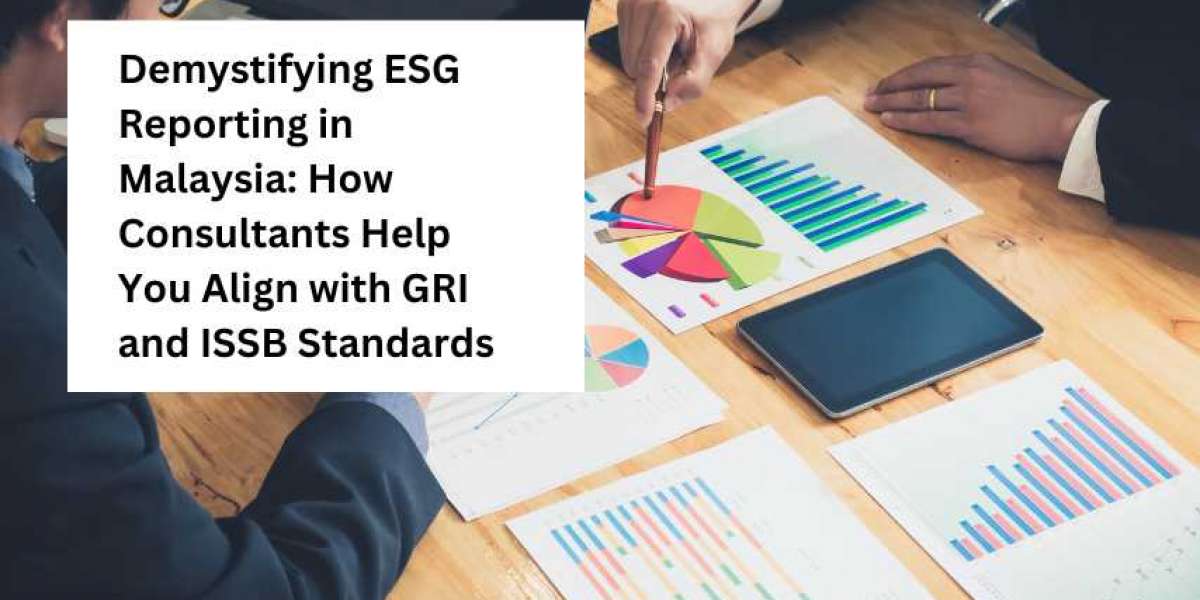Environmental, Social, and Governance (ESG) considerations are no longer just buzzwords; they have become central to the way businesses operate, grow, and sustain themselves. For companies in Malaysia, the pressure to deliver high-quality ESG reporting has grown significantly as investors, regulators, and stakeholders demand transparency and accountability. However, aligning these reports with global standards, especially frameworks like the Global Reporting Initiative (GRI) and the International Sustainability Standards Board (ISSB), can be daunting. This is where consultants play a key role in simplifying the process.
This article explores ESG reporting in Malaysia, the challenges companies face, and how consultants can guide you in aligning with global benchmarks. If you’re looking to improve your ESG reporting, this guide offers actionable insights and practical strategies.
The Current State of ESG Reporting in Malaysia
Malaysia has emerged as a regional leader in sustainability efforts, underpinned by regulatory pushes and growing awareness of environmental and social issues. The Malaysian government and financial regulators have introduced frameworks to foster ESG compliance, such as:
- Sustainable and Responsible Investment (SRI) policies launched by the Securities Commission Malaysia.
- Bursa Malaysia’s Sustainability Reporting Guide, making ESG disclosures mandatory for listed companies.
- Pelan Hala Tuju Kelestarian Malaysia 2050 (MySTR), which lays out long-term sustainability goals for the nation.
Growing Demands for Transparency
Investor behavior is shifting significantly, with a strong preference for companies that demonstrate transparent ESG practices. Malaysian companies are increasingly pressured to show clear and measurable impacts in areas such as carbon emissions, labor practices, and corporate governance. Multinationals operating in Malaysia also need to align their Malaysian operations with group-wide ESG commitments.
Why Global Standards Like GRI and ISSB Matter
Aligning with global ESG frameworks is vital for maintaining credibility and accessing international markets. Among these, the GRI Standards are widely regarded as the gold standard for sustainability reporting, emphasizing impact and accountability. Similarly, the ISSB Standards, with their focus on financial materiality, are becoming increasingly relevant as global sustainability reporting converges.
By adhering to standards like GRI and ISSB, Malaysian businesses can:
- Ensure better comparability of their ESG data globally.
- Fulfill compliance requirements in international supply chains.
- Build trust among global investors and partners.
Despite these benefits, many businesses struggle to adopt and align with these frameworks effectively.
Key Challenges in ESG Reporting for Malaysian Companies
Adopting robust ESG reporting practices is not without obstacles. Several challenges undermine companies’ efforts to produce precise, credible, and consistent ESG disclosures:
1. Lack of Standardized Methodologies
Currently, ESG reporting practices vary widely across industry sectors, with inconsistent methodologies making comparability and reliability a challenge.
2. Limited Internal Expertise
Most Malaysian companies lack internal teams equipped to handle complex ESG data collection and reporting. Subjects like climate metrics, social impacts, and governance details require specialized knowledge, which may not be readily available in-house.
3. High Costs
The cost of infrastructure, tools, and expertise to implement ESG frameworks can be prohibitive, particularly for small and medium enterprises (SMEs). Data collection technology, training workshops, and reporting software all contribute to rising costs.
4. Misalignment with Stakeholder Expectations
While businesses focus on compliance, stakeholders often demand broad and multidimensional ESG reporting. This clash between regulatory obligations and stakeholder demands creates a significant challenge.
5. Regulatory Evolution
The ESG landscape evolves constantly, with frameworks and guidelines being updated regularly. Companies find it hard to stay on top of changes, particularly when juggling multiple international and local mandates.
This array of challenges highlights why many Malaysian companies turn to ESG consultants for support.
How Consultants Help Malaysian Businesses Navigate ESG Reporting
Consultants bridge the gap between businesses and ESG success. With their expertise, Malaysian businesses can more efficiently meet global standards, identify material ESG topics, and create transparent narratives for stakeholders. Here's how reputable ESG consultants like Wellkinetics add value:
1. Expert Guidance on GRI and ISSB Frameworks
Consultants are well-versed in interpreting the GRI and ISSB standards, making it simple for companies to tailor their reporting frameworks following global norms. For example:
- GRI focuses on the triple-bottom-line impact (economic, environmental, and social). Consultants can help identify the most material aspects that match your company’s strategy and goals.
- ISSB specializes in financial materiality and enterprise value. Consultants aid in translating these standards into actionable metrics tied to reporting.
Their familiarity with these frameworks ensures a smoother compliance process.
2. Materiality Assessment
Materiality is the foundation of effective ESG reporting. Consultants conduct rigorous assessments to determine which issues are most relevant to your business and stakeholders. This ensures you’re not wasting resources on immaterial issues while focusing on what truly matters.
3. Data Analytics and Reporting Platforms
Proper ESG reporting requires robust data collection, analysis, and visualization. From setting up real-time monitoring systems to integrating data management software, consultants help streamline the entire process. They ensure that the data you report is accurate, auditable, and consistent.
4. Stakeholder Engagement
Engaging with stakeholders from investors to customers requires clear communication strategies. Consultants provide narratives backed by solid data, demonstrating how your company creates value for both shareholders and society.
5. Capacity Building
Rather than acting as one-time service providers, many consultants offer training sessions and toolkits to equip your internal teams with the skills needed for ongoing ESG reporting.
6. Cost-Effective Implementation
Consultants often act as a cost-effective resource for smaller businesses that cannot afford full-fledged internal teams. Their scalable models ensure even SMEs can adopt global ESG standards without breaking the bank.
Practical Steps for Aligning with GRI and ISSB Standards
When it comes to adopting global standards, a structured approach goes a long way. Below are actionable steps that Malaysian companies can follow to enhance their ESG reporting:
Step 1: Understand Your Company's ESG Impact
Start by evaluating how your operations impact the environment, society, and governance structures. Engage stakeholders both internal and external to identify critical ESG topics. Use tools like surveys, focus groups, and stakeholder interviews.
Step 2: Conduct a Materiality Assessment
With the help of consultants, conduct a materiality assessment to prioritize issues that matter the most to your stakeholders and bottom line. Align these findings with the disclosures recommended by the GRI and ISSB guidelines.
Step 3: Craft Your ESG Strategy
Based on identified material topics, create a comprehensive ESG strategy. This strategy should include measurable goals, timelines, and milestones. For example, if reducing greenhouse gas emissions is critical, set a clear target like “achieve carbon neutrality by 2030.”
Step 4: Build Internal Capacity
Invest in capacity building to educate and train your team on ESG reporting requirements. Consultants can deliver targeted workshops covering essential topics such as emissions tracking, biodiversity initiatives, and governance policies.
Step 5: Use Technology for Data Collection and Reporting
Investing in technology simplifies the daunting task of ESG data collection. Many tools and platforms specialize in tracking ESG indicators, compiling reports, and verifying compliance with frameworks like GRI and ISSB.
Step 6: Develop Transparent Reporting Practices
Follow a consistent and transparent reporting format that aligns with WHO your stakeholders are. Utilize GRI/ISSB frameworks to structure your report logically, clearly highlighting your company’s achievements, challenges, and areas for improvement.
Step 7: Continuously Monitor and Improve
ESG compliance is not a one-and-done activity. Establish systems for real-time monitoring of ESG performance. Ensure regular audits and updates to remain aligned with updated best practices and industry standards.
The Future of ESG in Malaysia
ESG reporting in Malaysia is poised for substantial growth as more stakeholders recognize its importance. The rising adoption of GRI and ISSB standards signifies a shift toward transparency, global alignment, and accountability.
Looking forward, businesses that adapt early will enjoy first-mover advantages such as enhanced investor confidence, access to sustainable financing, and greater operational efficiency. By partnering with a highly trusted ESG consultant in Malaysia, Malaysian companies can demystify the complexities of ESG compliance and emerge as leaders in sustainable growth.
Final Thoughts
ESG reporting in Malaysia is a complex but essential endeavor. Companies that align with global standards like GRI and ISSB are better positioned to meet stakeholder expectations, attract investment, and operate responsibly. Yet, the path to compliant reporting often involves hurdles such as lack of expertise, unclear methodologies, and evolving regulations.
Consultants act as invaluable allies in this process, offering the expertise, tools, and frameworks needed to succeed. By following structured steps—conducting materiality assessments, building internal capacity, and leveraging technology—businesses in Malaysia can confidently align their practices with global standards and thrive in the era of sustainable business operations.
Whether you’re an SME just beginning your ESG reporting or a large corporation looking to refine your approach, remember that the key to success is collaboration and proactive adaptation. With expert help, your company can lead the way in championing sustainability in Malaysia.








